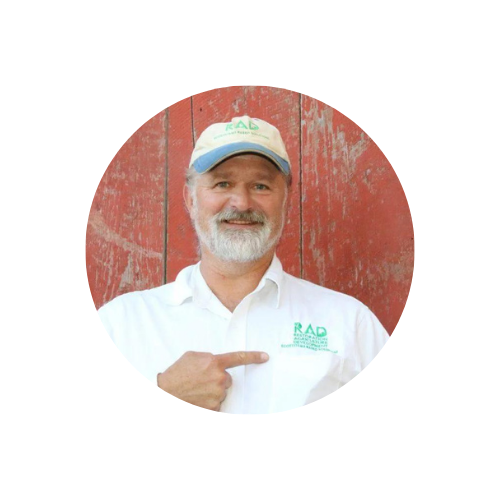Take Your Ecological Agriculture Education to the Next Level!
2024 Eco-Ag U Workshops
Dec. 2-3, 2024 • 8:30 a.m. - 4:00 p.m.
Dig in deeper to ecological and regenerative agriculture and take your goals to the next level with an all-day Eco-Ag U intensive workshop. We pick some of the finest speakers and educators in the world and offer our attendees a chance to learn from them in small classroom environments. If you are just getting started, or a veteran farmer looking for new strategies for success, selecting Eco-Ag U workshops will get you the right fundamentals to take home with you.
Each Eco-Ag U workshop is chock full of opportunities to learn from expert instructors, ask questions, and connect with others through dedicated networking times. All workshops take place on December 2 or 3 from 8:30 am – 4 pm and will include refreshment breaks and an opening reception on Monday evening, December 2.
We’re excited to help you be more successful by expanding your agriculture tool kit. Join us for one (or two!) Eco-Ag U workshops this year!
This schedule will continue to be updated for the 2024 event – sign up for our email newsletter to get informed of program updates as they happen!
Day 1 | Monday, December 2, 2024
Workshop 1: Ecosystem Restoration Through Soil Regeneration with Gabe Brown, Allen Williams, and Understanding Ag LLC.



Workshop 2: Building Permaculture Operations with Mark Shepard

Day 2 | Tuesday, December 3, 2024
Workshop 1: Ecosystem Restoration Through Soil Regeneration with Gabe Brown, Allen Williams, and Understanding Ag LLC.



Workshop 2: Unlocking the Potential of Regenerative Agriculture with John Kempf

Workshop Descriptions
Unlocking the Potential of Regenerative Agriculture
John Kempf & Greg Pennyroyal

- Monday, Dec 4th
While these principles apply to all crops, John and Greg’s focus in this course will be on fruit and vegetable production. They will cover:
Tapping into the untapped genetic potential of varieties to increase yields by understanding plant nutritional needs at different growth stages.
Enhancing photosynthesis by managing factors like carbon dioxide, water, chlorophyll levels, and leaf characteristics.
Nutritional strategies to fortify plants against insects and diseases.
Reducing water requirements through smart plant nutrition and soil management.
Understanding how insects communicate with plants and how nutritional profiles influence this interaction.
Creating soil with microbes that suppress diseases and provide essential minerals.
Managing fertilizer applications for soil and plant health.
Monitoring nutrient release for optimal crop growth and preventing unwanted pests.
This course assumes a foundational understanding of soil fertility and crop health, and it’s designed to help you reach new heights in soil and plant performance, building upon the wealth of webinars and resources available online.
Nutrient Density Unveiled: Bridging Biology and Technology
Dan Kittredge

- Monday, Dec 4th
This workshop will review the role of the 17 essential minerals for plant growth and production, and their interactions in the environment.
Specific agricultural practices such as tillage, irrigation, weed control, planting density, crop sequence and genetic selection influence disease control through nutrition.
Six keys to effective nutrient management for control of plant diseases will be presented with examples of environmental modification for increased production efficiency and pest control.
Participants should have a greater appreciation for the various interacting ways nutrition can be efficiently used to manage disease and maximize crop production efficiency by:
Modifying the environment to influence nutrient forms and availability.
Understanding the direct and indirect effect of nutrients on pathogen virulence and infectivity
Increasing plant resistance to disease
Integrating Annual Crops into Perennial Systems
Mark Shepard


- Monday, Dec 5th
Mark Shepard challenges convention by inviting you to completely change your opinion on two types of annual crops that are long blamed for our depleted soil health: grains and legumes. In this all-day session, he will teach you why they are absolutely essential to create true food systems that are resilient to pest and pestilence. Learn why he still grows these crops despite counting on his perennial crops 100% for his business. Also, learn how Mark helps farmers mitigate other risks in today’s challenging world with his approach to perennial, well-rounded systems.
Lessons from the Journey Into Regen Farming at Scale
Rick Clark

- Tuesday, Dec 5th
Take a deep dive into Indiana farmer, Rick Clark’s, journey to regenerative farming at scale. In this all-day intensive learn:
Why Rick and his family become regenerative farmers.
What steps he took to make the transition
The economics of transition and farming for regenerative organic with no-till
What struggles he’s faced and how he is addressing them
Why regenerative agriculture is critical to the future of agriculture
This will be a rare opportunity to see Rick go total transparent. Nothing is off the table. Come spend the day with Rick and try to better understand how he thinks about regenerative on the farm.
Bio-Intensive No-Till Vegetable Production
Jesse Frost

- Tuesday, Dec 5th
In this session, farmer Jesse Frost breaks down some of the ecological and bio-intensive methods he uses on his certified organic Central Kentucky farm to grow mixed market vegetables. Farmer Jesse will provide a solid roadmap of practical ways to
reduce and eliminate tillage, proven methods for maximizing space, utilizing cover crops on small acreage for fertility and ground cover, terminating cover crops, intercropping, production methods, and the different types of compost. He will guide attendees in applying practical principles to maximize soil health and land productivity, and help attendees meet their goals inside and outside of the garden.
Building Permaculture Operations
Mark Shepard

- Tuesday, Dec 5th
How to build and manage a diverse perennial polyculture Agroforestry farm in one simple lesson!
This intermediate to advanced workshop is for those who would like to establish a diverse, Restoration Agriculture /Permaculture/Agroforestry farm, beginning with rainwater and runoff management and selecting the appropriate “plant community” or “guild” for your conditions.
Learn how to:
Manage site fertility using cover crops differently, using ramial wood chips, mulching, chop-and-drop, legumes and livestock.
Use the economic power of the “Land Equivalent Ratio (LER)”, how to mimic nature’s inputs, all while reducing tillage, input costs and back-breaking labor.
Harvest from all phases of ecological succession from annual crops, short-term perennial crops to long-lived woody crops right up to the decay cycle. Come re-join the natural, ecological system!
Learn how to capture, redirect, store and discharge rainwater and manage runoff for drought-proofing and increased productivity.
Describe at least five virtually care-free “Plant community types” suited for your different conditions.
Become familiar with the economics of diversified agroforestry systems.
Provide step-by-step instructions through a calendar year, and discuss change across the years as the site matures.
Stay Tuned for Eco-Ag U updates!
Be sure you’re signed up for our News & Announcements email newsletter to get the latest updates on Eco-Ag Conference sessions and speakers, as well as other Acres U.S.A. event news! Sign up here.
If you have any questions, please email events@acresusa.com

